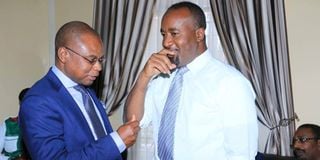Premium
Which way Coast? Region has no roadmap ahead of 2022 polls

Governors Amason Kingi (left) and Hassan Joho at a past event.
Coast region seems isolated with no clear roadmap ahead of next year’s polls as political realignments happen across the country with different regions seeking to have a say in the formation of the next government.
Currently, there is no political leader from the region participating in the talks going on about political coalitions to champion the region’s interests.
Political analysts have attributed the situation to lack of a strong political party that can negotiate, give direction and articulate issues on behalf of the coastal people.
This has led to other political parties and coalitions perceived to be strong in other regions to scramble for the 1.7 million Coast votes to top up what they have in their backyards.
No strong support system
Unlike other regions such as Central, Rift Valley, Lower Eastern and Nyanza, which are associated with parties that have massive regional support bases, parties associated with the Coast region seem not to have a strong support system to give them a seat at the national negotiating table.
The region has been termed “free for all” for major political parties and coalitions intent on forming the next government.
Wiper recently convened members’ meetings within various sub-counties in Mombasa with its leader Kalonzo Musyoka urging former members who contested in the last General Election to rejoin the party.
Deputy President Dr William Ruto and Orange Democratic Movement leader Raila Odinga have also recently visited the Coast to voters.
Mr Odinga said ODM would recruit young members in the region while noting that the registration was meant to bring “new blood into the party” so that they can work together with the older members to make the party stronger.
Small businesses
On his part, DP Ruto met with over 1,000 women engaged in small businesses from Kilifi South where he said that the United Democratic Alliance, the party he intends to vie on for the presidency, would end tribalism and improve the economy.
Political commentator Yusuf Aboubakar says voters in the Coast region have failed to popularise parties associated with the region and vote for their own.
“I blame the voters, they drive their leaders to other parties,” said Mr Aboubakar, adding that during the 2007 polls, Shirikisho Party negotiated with the Party of National Unity (PNU) but voters did not vote for it. He said the negotiations were to be the beginning of parties and leaders in the region to be involved in articulating the region’s issues at the national level.
Mr Aboubakar, said that lack of unity among parties associated with the region is a big disadvantage as they cannot negotiate as a block.
In an interview with the Nation about two months ago, Nyali MP Mohamed Ali said Coast leaders intended to join Kadu-Asili and use it to negotiate with Dr Ruto but their plans were sabotaged. Mr Ali, a close ally of the DP, said negotiating as a party has a bigger advantage than negotiating as an individual.
“The problem with Coast region is that those who seek the presidency and want votes know they can come fish and go. If we have a party, they know they have to talk with the party otherwise the party will say we are not going this way,” said Mr Ali.
General Election
Umoja Summit Party secretary-general Naomi Cidi conceded that the Coast region has not yet built its strategy to negotiate with other regions on the formation of the next government. Ms Cidi pointed out that for a long time, political leaders in the region have been used to riding on other parties to the disadvantage of the voters since they have no control in the affairs of the parties.
“Our focus is to unite before the next General Election and we are not late, we want an alliance with other parties but not a merger,” said Ms Cidi.
Political marketing consultant Bozo Jenje said Coast political leaders lack the much needed bargaining power compared to their counterparts in other regions. He attributes this to lack of resources and their failure to project themselves as national leaders.
“The region’s leaders need to project themselves as national leaders like the late Karisa Maitha and articulate on issues happening in the country,” said Mr Jenje. Mr Jenje said it would be hard for parties associated with the region to market themselves nationally before the next year’s polls.
Sometime last month, five parties associated with the Coast region united to form the Coast Integrated Development Initiative. Shirikisho Party of Kenya, Kadu-Asili, Republican Congress Party of Kenya, Umoja Summit Party of Kenya and the Communist Party of Kenya said they were working to unite the region and speak with one voice.





